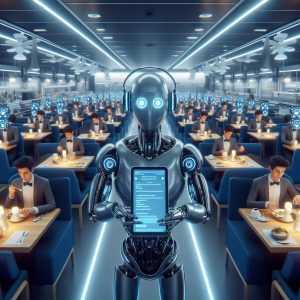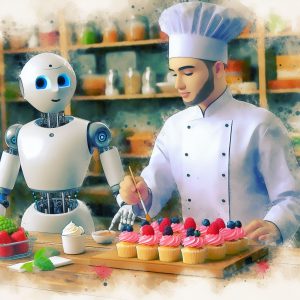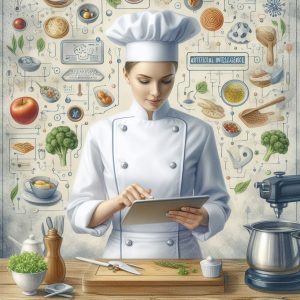Introduction
The culinary world has undergone a remarkable transformation over the years, with the advent of technology revolutionizing the way chefs prepare, cook, and serve food. From humble kitchen spaces to AI-powered kitchens of the future, chefs have embraced innovation to enhance their craft and create unforgettable dining experiences. In this blog, we will explore the journey of chefs, from the traditional kitchen to the AI-powered kitchens of tomorrow.
The Traditional Kitchen: A Chef’s Sanctuary
For centuries, chefs honed their skills in the confines of traditional kitchens. These kitchens were characterized by their warmth, aromas, and the symphony of pots and pans. Chefs relied on their intuition, experience, and culinary knowledge to create dishes that delighted the senses. The kitchen was a place of passion, artistry, and dedication, where chefs poured their heart and soul into every creation.
The Rise of Technology in the Kitchen
With the advancement of technology, the kitchen landscape began to change. Chefs gained access to a plethora of new tools and gadgets that assisted them in their culinary endeavors. From precise measuring devices to high-tech cooking equipment, technology provided chefs with more control over the cooking process and enabled them to create more intricate and sophisticated dishes.
AI Enters the Kitchen: A New Era of Culinary Innovation
The introduction of artificial intelligence (AI) in the kitchen has ushered in a new era of culinary innovation. AI-powered kitchens harness the power of data, machine learning, and automation to assist chefs in various aspects of their work. From recipe creation and ingredient selection to cooking techniques and personalized dining experiences, AI is transforming the way chefs approach their craft.
Benefits of AI in the Kitchen
The integration of AI in kitchens offers numerous benefits for chefs and the餐饮业as a whole:
- Enhanced Efficiency: AI automates repetitive tasks, allowing chefs to focus on more creative aspects of cooking.
- Improved Consistency: AI-powered cooking systems ensure consistency in food preparation, resulting in high-quality dishes every time.
- Personalized Dining Experiences: AI algorithms analyze customer preferences and dietary restrictions to create personalized menus and recommendations.
- Innovation and Experimentation: AI provides chefs with data-driven insights and suggestions, encouraging them to experiment with new flavors, textures, and cooking techniques.
- Sustainability and Resource Management: AI helps chefs optimize resource allocation, reduce waste, and make more sustainable choices in the kitchen.
Challenges and Concerns
While AI holds immense potential for transforming the culinary world, there are also challenges and concerns associated with its adoption:
- Job Displacement: Some fear that AI might lead to job displacement in the餐饮业, as automated systems could potentially replace certain tasks traditionally performed by chefs.
- Loss of Culinary Art and Creativity: Others express concerns that AI might stifle creativity and innovation in cooking, as chefs rely more on algorithms and data than their own intuition and experience.
- Data Privacy and Security: The use of AI in kitchens raises questions about data privacy and security, as vast amounts of customer data are collected and analyzed.
The integration of AI in kitchens is a rapidly evolving field that offers both opportunities and challenges for the culinary world. As technology continues to advance, chefs will need to embrace lifelong learning and adapt to new ways of working in AI-powered kitchens. However, it is crucial to strike a balance between automation and the human touch, ensuring that AI enhances the chef’s craft rather than replacing it. The future of cooking lies in the harmonious collaboration between chefs and AI, where technology empowers chefs to create even more exceptional and memorable dining experiences for their patrons.

Dangers for Chefs in the Food Industry
The food industry is constantly evolving, and with the rise of artificial intelligence (AI), chefs are facing new challenges and opportunities. While AI has the potential to revolutionize the food industry, it also poses some dangers for chefs.
1. Job Loss: One of the biggest concerns for chefs is the potential for job loss. As AI-powered robots and machines become more sophisticated, they could potentially replace human chefs in many tasks, such as food preparation, cooking, and even dishwashing. This could lead to widespread unemployment and a decline in the number of chefs in the workforce.
2. Loss of Creativity: Chefs are often passionate about their work and take pride in their creativity. However, AI-powered systems could potentially limit their ability to express their creativity and experiment with new dishes. This could lead to a homogenization of food and a decline in the diversity of culinary experiences.
3. Safety Concerns: AI-powered machines and robots can be dangerous if they are not properly programmed and maintained. This could lead to accidents and injuries in the workplace. Chefs need to be trained on how to safely operate and work with AI-powered equipment.
Possibilities of Chef Job Being Replaced by AI
While AI poses some dangers for chefs, it also offers some potential benefits. AI-powered systems could be used to:
1. Automate Tasks: AI-powered robots and machines could be used to automate many of the repetitive and time-consuming tasks that chefs currently perform, such as chopping vegetables, measuring ingredients, and cooking food. This could free up chefs to focus on more creative and challenging tasks, such as developing new dishes and experimenting with new flavors.
2. Improve Efficiency: AI-powered systems could be used to improve the efficiency of food preparation and cooking. This could lead to faster service and lower costs for restaurants and consumers.
3. Enhance Customer Experience: AI-powered systems could be used to enhance the customer experience by providing personalized recommendations, tracking preferences, and suggesting new dishes. This could lead to increased customer satisfaction and loyalty.
How AI Will Be Used to Help Chefs
AI is still a relatively new technology, but it is already being used in a variety of ways to help chefs. For example, AI-powered systems can be used to:
1. Manage Inventory: AI-powered systems can be used to track food inventory, predict demand, and generate purchase orders. This can help chefs to avoid spoilage and ensure that they always have the ingredients they need on hand.
2. Develop Recipes: AI-powered systems can be used to develop new recipes and suggest new flavor combinations. This can help chefs to create innovative and exciting dishes that their customers will love.
3. Train New Chefs: AI-powered systems can be used to train new chefs on the basics of cooking and food safety. This can help to ensure that new chefs are properly trained and prepared for the job.
How to Adapt to the Changing Landscape
The food industry is changing rapidly, and chefs need to be prepared to adapt to the changing landscape. Here are a few tips for chefs on how to stay ahead of the curve:
1. Embrace Technology: Chefs should embrace new technologies, such as AI, and learn how to use them to their advantage. This can help them to improve their efficiency, creativity, and overall job performance.
2. Develop New Skills: Chefs should also develop new skills, such as programming and data analysis, that will be in demand in the future. This will help them to stay relevant and competitive in the job market.
3. Be Creative and Innovative: Chefs should continue to be creative and innovative in their work. This is what sets them apart from AI-powered systems and will ensure that they remain valuable members of the food industry.
The food industry is changing rapidly, and chefs need to be prepared to adapt to the changing landscape. By embracing technology, developing new skills, and being creative and innovative, chefs can stay ahead of the curve and continue to be successful in their careers.



